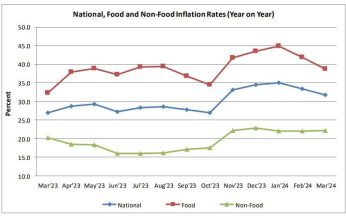RBM intensifies campaign on proper banknote handling
As the country loses billions in replacing worn out banknotes, the Reserve Bank of Malawi (RBM) has intensified its campaign on proper handling of banknotes through training sessions for master of ceremonies (MCs) to advise the public at celebratory events.
In a response to a questionnaire, RBM spokesperson Mbane Ngwira said proper handling of notes will cut the bank costs.

President of the Association of Master of Ceremonies(North) who were recently trained, Martin Chingaipe Nkhoma, said they will urge their audiences against flashing and trampling on bank notes during celebratory events.
Ngwira also said the bank will take advantage of Financial Literacy Week and other road shows to sensitise the public against excessive folding, crumpling, scribbling and handling notes with wet or dirty hands.
He said the bank is also enhancing the durability of the notes and encouraging the use of wallets.
Ngwira said RBM is studying the developments in currency advancements.
“Durability of plastic money may not be the only consideration for a country to migrate from paper to plastic money,” Ngwira said in reference to the introduction of plastic polymer which is difficult to rip up.
RBM director of banking and currency management Mercy Kumbatira is on record as having said the bank loses about K7.7 billion (US$17 million) in importing currency while by January it had far spent over K6 billion (US$13 million) in the notes issued in circulation without including costs of sorting.
She said because of careless handling of the notes, the life span of K20 and K50 is reduced from six months to three months while for larger denominations it is reduced to nine months from two years.
Kumbatira said at the moment the bank spends K23 to buy every note and there are plenty of notes that need replacement.
Intentional soiling or destroying of currency carries a custodial sentence of up to seven years imprisonment.





